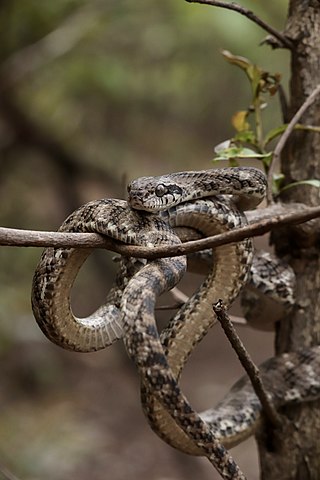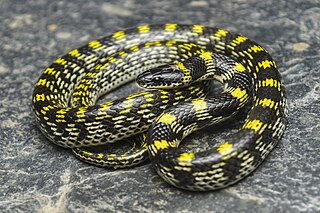
The Himalayan keelback is a species of grass snake in the family Colubridae. The species is endemic to South Asia.

The banded wolf snake, is a species of colubrid snake. Sometimes called the banded racer, that name is used for snakes in the genus Platyceps.

Boiga forsteni, also known commonly as Forsten's cat snake, is a species of mildly venomous rear-fanged snake in the family Colubridae. The species is endemic to South Asia.

Boiga trigonata, commonly known as the Indian gamma snake or common cat snake, is a species of rear-fanged colubrid endemic to South Asia.

Lycodon aulicus, commonly known as the Indian wolf snake or common wolf snake, is a species of nonvenomous snake found in South Asia and Southeast Asia. Early naturalists have suggested its resemblance to the venomous common krait as an instance of Batesian mimicry.

The banded kukri snake, russet kukri snake, or common kukri snake,, is a species of nonvenomous colubrid found mainly in South Asia.

Lycodon bicolor, commonly known as the Two-coloured wolf snake, Bicolored wolf snake, or the Golden wolf snake, is a species of snake in the family Colubridae. The species is endemic to Western Himalaya.

Sibynophis collaris, commonly known as the common many-toothed snake,Betty's many toothed snake or the collared black-headed snake, is a species of colubrid snake endemic to South and East Asia.
Trachischium fuscum, also known as the blackbelly worm-eating snake or the Darjeeling slender snake, is a species of colubrid snake, which is endemic to Asia. The specific name, fuscum, is Latin for "dusky" or "dark brown".
Trachischium guentheri, commonly known as the rosebelly worm-eating snake or Günther's worm-eating snake, is a species of colubrid snake, which is endemic to Asia.
The mountain worm-eating snake is a species of colubrid snake.

Trachischium tenuiceps, also known as the yellowbelly worm-eating snake, is a species of colubrid snake found in South Asia and Tibet.

Eryx conicus is a species of non-venomous snake in the subfamily Erycinae of the family Boidae. The species is native to southern Asia. No subspecies are recognised as being valid.

Günther's black snake is a species of poorly known lamprophiid snake endemic to central Africa. It is the only member of the genus, Bothrolycus. This snake is notable as one of the few snakes with notable sexual dimorphism, as well as possessing a small pit anterior to the eye. While superficially similar to the thermal pits of vipers, its function remains unknown.

Trachischium is a genus of snakes, known commonly as slender snakes or worm-eating snakes, in the subfamily Natricinae of the family Colubridae. The genus is endemic to Asia.

The Seychelles wolf snake is a species of snake in the superfamily Colubroidea. It is monotypic within the genus Lycognathophis. The Neo-Latin name, Lycognathophis, is derived from the Greek words λύκος (lykos) meaning "wolf", γνάθος (gnathos) meaning "jaw", and όφις (ophis) meaning "snake", referring to the snake's dentition.

Trimeresurus sumatranus is a species of venomous pitviper found in the tropical forests of Indonesia, Malaysia and Thailand. Arboreal by nature, its coloration is pale to neon-green, with some black vertical markings, and a red-tipped tail. As with other vipers, this species has prominent, “keeled” scales, which appear somewhat raised and give the snake a rough-textured appearance. Common names include Sumatran pitviper, Sumatran tree viper, and Sumatran pit viper.

The Cape file snake is a species of large, non-venomous snake endemic to Africa, belonging to the family Lamprophiidae.

Wallaceophis is a genus of snake in the family Colubridae. It was first described in 2016. The sole species is Wallaceophis gujaratensis which is found in the Indian state of Gujarat. Wallaceophis gujaratenisis is presently known from just seven localities of Gujarat and virtually nothing is known about its biology. Common names Wallace's striped snake and Wallace's racer has been suggested for it.

Telescopus beetzi, commonly known as Beetz's tiger snake, is a species of snake in the family Colubridae. The species is native to southern Africa.

















